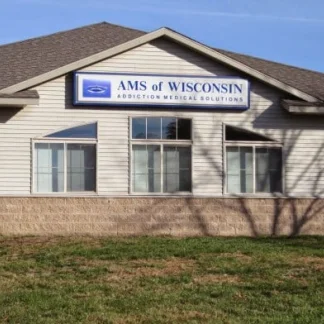Mayo Clinic Health System - Franciscan Healthcare
Mayo Clinic Health System - Franciscan Healthcare provides outpatient treatment ...
AMS is a CARF-accredited substance abuse treatment center located in Onalaska, Wisconsin. The center specializes in providing comprehensive medication-assisted treatment rehabilitation services to individuals struggling with opiate use disorder.
At AMS of Onalaska, the path to overcoming addiction is paved with personalized care, emphasizing the uniqueness of each individual’s recovery journey. With a full spectrum of treatment options, they are well-equipped to cater to the diverse needs of their patients. Intensive Outpatient Program (IOP) For those requiring a more structured environment, the intensive outpatient program (IOP) combines group and individual counseling. It’s an intensive approach to address substance abuse and its underlying causes, ensuring a thorough healing process. Outpatient Program Offering flexibility, the outpatient program serves patients who are in the recovery phase but still require ongoing support. Through one-on-one counseling sessions, individuals can focus on topics like relapse prevention, co-occurring disorder management, and life skills enhancement. Medication-Assisted Treatment (MAT) Acknowledging the challenges of opioid dependency, AMS of Onalaska’s medication-assisted treatment (MAT) offers medications like methadone, buprenorphine, or naltrexone, paired with counseling services. This combined approach ensures patients have both the pharmacological and psychological support they need. Aftercare Planning Recognizing that recovery is an ongoing journey, the aftercare planning service is designed to provide patients with continuous guidance post-treatment. It ensures they have the resources and support mechanisms to maintain sobriety in the long run.
Contact us for more information: (608) 783-0506

Connect with AMS by calling their admissions team directly.
(608) 783-0506 Website Get DirectionsThe Substance Abuse and Mental Health Services Administration (SAMHSA) is a branch of the U.S. Department of Health and Human Services. Established in 1992 by congress, SAMHSA's mission is to reduce the impact of substance abuse and mental illness on American's communities.
SAMHSA Listed: Yes
Research clearly demonstrates that recovery is far more successful and sustainable when loved ones like family members participate in rehab and substance abuse treatment. Genetic factors may be at play when it comes to drug and alcohol addiction, as well as mental health issues. Family dynamics often play a critical role in addiction triggers, and if properly educated, family members can be a strong source of support when it comes to rehabilitation.
Group therapy is any therapeutic work that happens in a group (not one-on-one). There are a number of different group therapy modalities, including support groups, experiential therapy, psycho-education, and more. Group therapy involves treatment as well as processing interaction between group members.
Trauma therapy addresses traumatic incidents from a client's past that are likely affecting their present-day experience. Trauma is often one of the primary triggers and potential causes of addiction, and can stem from child sexual abuse, domestic violence, having a parent with a mental illness, losing one or both parents at a young age, teenage or adult sexual assault, or any number of other factors. The purpose of trauma therapy is to allow a patient to process trauma and move through and past it, with the help of trained and compassionate mental health professionals.
Group therapy is any therapeutic work that happens in a group (not one-on-one). There are a number of different group therapy modalities, including support groups, experiential therapy, psycho-education, and more. Group therapy involves treatment as well as processing interaction between group members.
Trauma therapy addresses traumatic incidents from a client's past that are likely affecting their present-day experience. Trauma is often one of the primary triggers and potential causes of addiction, and can stem from child sexual abuse, domestic violence, having a parent with a mental illness, losing one or both parents at a young age, teenage or adult sexual assault, or any number of other factors. The purpose of trauma therapy is to allow a patient to process trauma and move through and past it, with the help of trained and compassionate mental health professionals.
Trauma therapy addresses traumatic incidents from a client's past that are likely affecting their present-day experience. Trauma is often one of the primary triggers and potential causes of addiction, and can stem from child sexual abuse, domestic violence, having a parent with a mental illness, losing one or both parents at a young age, teenage or adult sexual assault, or any number of other factors. The purpose of trauma therapy is to allow a patient to process trauma and move through and past it, with the help of trained and compassionate mental health professionals.
Mayo Clinic Health System - Franciscan Healthcare provides outpatient treatment ...
Mayo Clinic Health System - Franciscan Healthcare provides outpatient treatment ...
Mayo Clinic Health System – Franciscan Professional Building is a private rehab ...
Coulee Youth Centers – Social Services is a private rehab located in La Crosse, ...